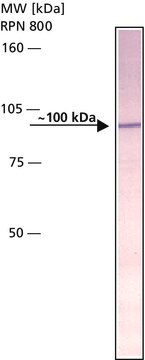MAB343
Anti-APP Antibody, APP 643-695 CT fragment, clone 2.F2.19B4
ascites fluid, clone 2.F2.19B4, Chemicon®
Sinonimo/i:
APP, Jonas clone
Autenticatiper visualizzare i prezzi riservati alla tua organizzazione & contrattuali
About This Item
Codice UNSPSC:
12352203
eCl@ss:
32160702
NACRES:
NA.41
Prodotti consigliati
Origine biologica
mouse
Livello qualitativo
Forma dell’anticorpo
ascites fluid
Clone
2.F2.19B4, monoclonal
Reattività contro le specie
rat, human
Produttore/marchio commerciale
Chemicon®
tecniche
immunohistochemistry: suitable (paraffin)
western blot: suitable
Isotipo
IgG1
N° accesso NCBI
N° accesso UniProt
Condizioni di spedizione
dry ice
modifica post-traduzionali bersaglio
unmodified
Informazioni sul gene
human ... APP(351)
Specificità
Reacts with intact full-length Alzheimer precursor protein (APP) and selectively with the cytoplasmic carboxyl fragment of APP 643-695. Epitope has reportedly been mapped in this paper http://www.impub.co.uk/abs/W386.html
Immunogeno
Carboxyl fragment of APP 643-695 / Jonas.
Epitope: APP 643-695 C-terminal fragment
Applicazioni
Immunohistochemistry on paraffin sections: 10-20 μg/mL * See protocol below.
Western blot: 10 μg/mL
Optimal working dilutions must be determined by end user.
APPLICATION NOTES FOR MAB343
IMMUNOHISTOCHEMISTRY
1) Prepare paraformaldehyde-fixed paraffin sections. Wash twice for 5 min in xylene to deparaffinize. Wash sections for 5 min in a descending series of alcohol solutions (100%, 96%, 90%, 80%, 70%, 50%, 30%).
2) Wash sections 3 times in distilled water.
3) Wash in TBS (50 mM Tris-HCl, 150 mM NaCl, pH 7.6). To block endogenous peroxidase wash with methanol containing 0.6% H2O2 (v/v) and 10 % horse serum (v/v) for 5 min at room temperature.
4) Wash sections for 5 min in TBS.
5) Incubate sections with MAB343 (diluted in TBS containing 10% horse serum (v/v)) overnight at +4°C or for 2 hours at 37°C in a humid chamber.
6) Wash sections 3 times in TBS for 5 min..
7) Detect with standard secondary antibody detection system (PAP, ABC, etc.).
8) Wash sections in TBS.
9) Embed sections and examine.
Western blot: 10 μg/mL
Optimal working dilutions must be determined by end user.
APPLICATION NOTES FOR MAB343
IMMUNOHISTOCHEMISTRY
1) Prepare paraformaldehyde-fixed paraffin sections. Wash twice for 5 min in xylene to deparaffinize. Wash sections for 5 min in a descending series of alcohol solutions (100%, 96%, 90%, 80%, 70%, 50%, 30%).
2) Wash sections 3 times in distilled water.
3) Wash in TBS (50 mM Tris-HCl, 150 mM NaCl, pH 7.6). To block endogenous peroxidase wash with methanol containing 0.6% H2O2 (v/v) and 10 % horse serum (v/v) for 5 min at room temperature.
4) Wash sections for 5 min in TBS.
5) Incubate sections with MAB343 (diluted in TBS containing 10% horse serum (v/v)) overnight at +4°C or for 2 hours at 37°C in a humid chamber.
6) Wash sections 3 times in TBS for 5 min..
7) Detect with standard secondary antibody detection system (PAP, ABC, etc.).
8) Wash sections in TBS.
9) Embed sections and examine.
Research Category
Neuroscience
Neuroscience
Research Sub Category
Neurodegenerative Diseases
Neurodegenerative Diseases
This Anti-APP Antibody, APP 643-695 C-terminal fragment, clone 2.F2.19B4 is validated for use in IH(P), WB for the detection of Alzheimer Precursor Protein.
Stato fisico
Liquid.
Unpurified
Stoccaggio e stabilità
Maintain lyophilized material at +2–8°C for up to 12 months. After reconstitution maintain frozen at -20°C in undiluted aliquots for up to 6 months. Avoid repeated freeze/thaw cycles.
Risultati analitici
Control
Brain
Brain
Altre note
Concentration: Please refer to the Certificate of Analysis for the lot-specific concentration.
Note legali
CHEMICON is a registered trademark of Merck KGaA, Darmstadt, Germany
Esclusione di responsabilità
Unless otherwise stated in our catalog or other company documentation accompanying the product(s), our products are intended for research use only and are not to be used for any other purpose, which includes but is not limited to, unauthorized commercial uses, in vitro diagnostic uses, ex vivo or in vivo therapeutic uses or any type of consumption or application to humans or animals.
Raccomandato
N° Catalogo
Descrizione
Determinazione del prezzo
Codice della classe di stoccaggio
10 - Combustible liquids
Classe di pericolosità dell'acqua (WGK)
WGK 1
Punto d’infiammabilità (°F)
Not applicable
Punto d’infiammabilità (°C)
Not applicable
Certificati d'analisi (COA)
Cerca il Certificati d'analisi (COA) digitando il numero di lotto/batch corrispondente. I numeri di lotto o di batch sono stampati sull'etichetta dei prodotti dopo la parola ‘Lotto’ o ‘Batch’.
Possiedi già questo prodotto?
I documenti relativi ai prodotti acquistati recentemente sono disponibili nell’Archivio dei documenti.
Eun Mi Hwang et al.
Bioorganic & medicinal chemistry, 16(14), 6669-6674 (2008-06-21)
In order to access beta-secretase (BACE1), and enzyme strongly implicated in the cause of Alzheimer's disease, inhibitors must possess sufficient lipophilicity to traverse two lipid bilayers. Current drug candidates, which are almost totally peptide-derived, are thus inefficient because cell permeability
Gregory D Van Vickle et al.
Biochemistry, 46(36), 10317-10327 (2007-08-21)
We investigated the morphology and biochemistry of the amyloid-beta (Abeta) peptides produced in TgCRND8 Tg mice carrying combined amyloid precursor protein (APP) Swedish (K670M/N671L) and Indiana (V717F) mutations. Histological analyses employing amyloid-specific staining and electron microscopy revealed that the TgCRND8
Effects of peptides derived from BACE1 catalytic domain on APP processing.
Seung Woo Yeon, Yong-Jin Jeon, Eun Mi Hwang, Tae-Yong Kim
Peptides null
A TAG1-APP signalling pathway through Fe65 negatively modulates neurogenesis.
Quan-Hong Ma, Toshitaka Futagawa, Wu-Lin Yang, Xiao-Dan Jiang, Li Zeng, Yasuo Takeda et al.
Nature Cell Biology null
P Ponte et al.
Nature, 331(6156), 525-527 (1988-02-11)
The amyloid proteins isolated from neuritic plaques and the cerebrovasculature of Alzheimer's disease are self-aggregating moieties termed A4 protein and beta-protein, respectively. A putative A4 amyloid precursor (herein termed A4(695] has been characterized by analysis of a human brain complementary
Il team dei nostri ricercatori vanta grande esperienza in tutte le aree della ricerca quali Life Science, scienza dei materiali, sintesi chimica, cromatografia, discipline analitiche, ecc..
Contatta l'Assistenza Tecnica.